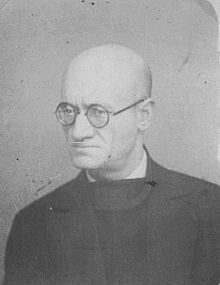Sascha Schapiro
Sascha Schapiro Александр Шапиро Олександр Шапіро | |
|---|---|
 | |
| Born | c. 1889 |
| Died | 1942 |
| Known for | Anarchism,Participation in theRussian Revolution,Participation in theSpanish Civil War |
| Partner | Hanka Grothendieck |
| Children | Alexander Grothendieck |
Alexander "Sascha" Schapiro(Russian:Александр Шапиро,Ukrainian:Олександр Шапіро;c. 1889– 1942), also known by thenoms de guerreAlexander Tanarov,Sascha Piotr,andSergei,was a Jewish Ukrainiananarchistwho fought in both theRussian Civil Warand theSpanish Civil War.Born to a wealthy family, Schapiro renounced the privileges of his upbringing and became affiliated with anarchists in his teenage years. After the dawn of theRussian Revolution,Schapiro aligned himself with theRevolutionary Army of Ukraine,and he fought alongsideNestor MakhnoandMaria Nikiforovauntil the defeat of the anarchists at the hands of theRed Armyin theRussian Civil War.
Following the suppression of anarchism in the Soviet Union, Schapiro escaped to Germany, living inBerlinprior to the rise ofAdolf Hitlerand theNazi Party.After the rise of German fascism, Schapiro left for Spain and fought alongside the anarchists in theSecond Spanish Republic.Upon the victory of the Spanish fascists andFrancisco Franco,Schapiro escaped and attempted to hide inNazi-occupied France,but he was quickly found by theVichyauthorities and handed over to the Nazis. Schapiro was subsequently murdered in theAuschwitz-Birkenau extermination campin 1942.
While living in Berlin, Schapiro was in a relationship with fellow anarchist and journalist Johanna Grothendieck. Grothendieck gave birth to Schapiro's sonAlexander Grothendieckin 1928. Alexander Grothendieck would go on to become one of the most famous and renowned mathematicians of the 20th century.[1][2]
Early years and Russian revolutions[edit]
Born into aHasidicfamily in the predominantly Jewish border town ofNovozybkov,Russia in 1889, Alexander Schapiro grew up identifying more with the impoverished proletariat than with his own well-to-do family.[2]In 1904 at the age of fourteen, he left the town and joined an anarchist militant group (akin to theChernoznamentsy) who were rounded up by the authorities in 1905 after an unsuccessful attempt to murder CzarNicholas II.[1][2]All were executed save Schapiro, who was spared on account of his youth, and was instead sentenced to life imprisonment inMoscow.He escaped lingering death there by the intercession of an influential friend who secured his transfer toYaroslavl,where he stayed for twelve years.[1]It was here that Schapiro was shot in his left arm whilst trying to escape, resulting in its amputation.[2]After an attempted suicide, he spent the year 1914 insolitary confinement.[2]
With the collapse of theCzaristregime in Russia in 1917, Schapiro was released, and hailed as a national hero.[1]He was one of a number of anarchists who spoke out against therepresentativesystem for electing theConstituent Assemblyproposed byAlexander Kerensky'sRussian Provisional Government,writing that "no parliament can break the path toward liberty, that the good society can be realized only through 'the abolition of all power'".[3]He befriended the anarchist revolutionariesLev ChernyiandMaria Nikiforovaand became a leading figure in a cadre of heavily armed anarchists fighting in Ukraine associated withNestor Makhno'sInsurgent Army.[2]Schapiro lead a tempestuous life in Russia between 1917 and 1921 in an atmosphere of increasing repression of anarchists by the Bolshevik regime, marrying a Jewish woman named Rachil, with whom he had a son, Dodek.[2]In an attempt to evade the Bolsheviks searching for him, he fled in 1921 toMinsk,where he encountered and was financially supported byAlexander Berkman.[2]With the assistance of a Jewish woman named Leah, Schapiro then crossed the Russian-Polish border using forged papers bearing the name ofAlexander Tanarov.[2]
Life in Europe, family and death[edit]
By 1922, Schapiro had reachedBerlin,where he remained save for spells in Paris and Belgium until 1924.[1][2]There, he assumed the nameSacha Piotrand throughout the 1920s was an active participant in the anarchist movement, in 1928 becoming friends with prominent Spanishanarcho-syndicalistsFrancisco AscasoandBuenaventura Durruti,Italian anarchist Francesco Ghezzi and German authorTheodor Plievier,who dedicated his 1927 novelStienka Rasinto Schapiro.[2]In Paris, he was a regular at the artist's hangout Café Dome, and befriended journalist and artist Aron Brzezinski, who made abronze bustof him, as well as the novelistScholem Asch.During this period he was in infrequent contact with Makhno and hisplatformistDielo Trudagroup, who were based in Paris.[2]
Schapiro was one of the founding members, alongsideSébastien Faure,Ugo FedeliandHenryk Walecki,of the Paris-basedŒuvres Internationales Des Editions Anarchistes(International Works of Anarchist Editions). He contributed at least two articles to the publication, run at that time by the anarchistSeverin Ferandel.[2]
Schapiro met anarchist journalistHanka Grothendieck,who was then married to left wing journalist Alf Raddatz, through the movement in Berlin while working as a street photographer. Due to the increasingly anti-Semitic environment in Europe at the time, the couple decided to give their son Alexander the surname of Grothendieck's well-establishedHamburgmiddle-class family. Forced to flee Germany after the rise to power ofAdolf Hitler,and intent on fighting in the comingSpanish Civil War,the couple sent Alexander to live with the Heydorns, a middle-class family with anarchist sympathies, in 1933.[1]
In Spain, under the nameSacha Pietra,Schapiro fought the fascists until the defeat of theSecond Spanish Republic,after which he and his wife crossed the French border and he was interned atCamp Vernetwith his comrades.[2]The Heydorns had cared for Alexander in Berlin for seven years, but decided in May 1939, shortly before France entered theSecond World War,that it had become too dangerous to keep him and he was put on a train to Paris to his parents.[1]
InOccupiedParis, Schapiro was free for a short time, constantly active in the anarchist movement, until he was arrested and sent toCamp Vernet,then deported toAuschwitz concentration campin 1942, where he was subsequently murdered.[2][4]
See also[edit]
References[edit]
- ^abcdefg Lisker, Roy (June 1988)."Grothendieck Quest".Ferment Magazine.RetrievedMarch 20,2009.
- ^abcdefghijklmnoHeath, Nick (September 3, 2008)."Sacha Piotr (Sascha Pjotr) aka Alexander Shapiro aka Sergei 1889/1890-1942(?)".Libcom.org.RetrievedMarch 20,2009.
- ^Watner, Carl."Voluntaryism In The European Anarchist Tradition".The Voluntaryist.RetrievedMarch 20,2009.
- ^Rehmeyer, Julie (May 9, 2008)."Sensitivity to the harmony of things".Science News.RetrievedMarch 20,2009.
- 1942 deaths
- Soviet people who died in Auschwitz concentration camp
- Jewish anarchists
- Ukrainian anarchists
- Ukrainian anti-fascists
- Ukrainian Jews who died in the Holocaust
- Russian Jews who died in the Holocaust
- Soviet civilians killed in World War II
- People from Novozybkov
- Ukrainian revolutionaries
- Politicians who died in the Holocaust
- Assassinated anarchists
